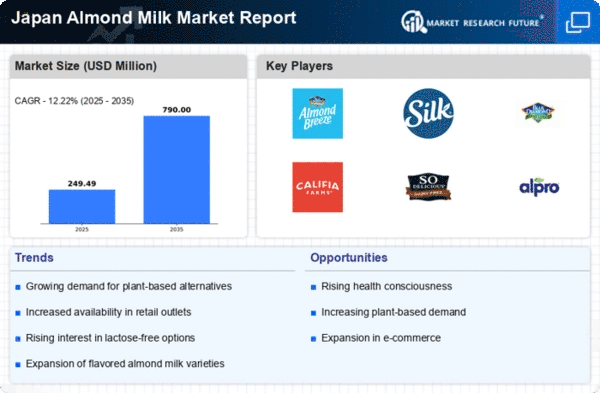Innovative Marketing Strategies
The almond milk market in Japan is witnessing a transformation due to innovative marketing strategies employed by brands. Companies are increasingly utilizing social media platforms and influencer partnerships to reach younger demographics, who are more inclined towards plant-based diets. This approach appears to resonate well, as the almond milk market reports a rise in brand engagement and consumer loyalty. Furthermore, promotional campaigns highlighting the versatility of almond milk in various culinary applications, such as smoothies and baking, are gaining traction. By effectively communicating the benefits and uses of almond milk, brands are likely to enhance consumer awareness and drive sales, contributing to the overall growth of the almond milk market.
Rising Demand for Dairy Alternatives
The almond milk market in Japan experiences a notable increase in demand for dairy alternatives, driven by a growing awareness of lactose intolerance among consumers. Approximately 30% of the Japanese population is estimated to be lactose intolerant, leading many to seek plant-based options. This shift towards non-dairy beverages aligns with the broader trend of health-conscious consumption. As a result, the almond milk market is witnessing a surge in product offerings that cater to this demographic, including flavored and fortified almond milk products. The increasing availability of almond milk in retail outlets and cafes further supports this trend, making it more accessible to consumers. Consequently, the almond milk market is poised for continued growth as more individuals opt for dairy-free alternatives in their diets.
Sustainability and Ethical Consumption
The almond milk market in Japan is increasingly shaped by consumer preferences for sustainability and ethical consumption. As environmental concerns gain prominence, many consumers are seeking products that align with their values. Almond milk, often perceived as a more sustainable alternative to dairy milk, is gaining traction among eco-conscious buyers. The almond milk market is responding by emphasizing sustainable sourcing practices and eco-friendly packaging solutions. Reports indicate that approximately 70% of Japanese consumers are willing to pay a premium for products that are environmentally friendly. This trend suggests that the almond milk market could see substantial growth as brands align their offerings with the sustainability ethos of their target audience.
Shift Towards Vegan and Plant-Based Diets
The almond milk market in Japan is significantly influenced by the increasing shift towards vegan and plant-based diets. As more consumers adopt these lifestyles, the demand for plant-based milk alternatives, including almond milk, is on the rise. Reports suggest that the plant-based food market in Japan is projected to grow at a CAGR of 10% over the next five years, indicating a robust interest in vegan options. This trend is further supported by the almond milk market, which is expanding its product lines to include organic and non-GMO options, appealing to environmentally conscious consumers. The alignment of almond milk with vegan dietary preferences positions it favorably in a rapidly evolving market landscape.
Increased Awareness of Nutritional Benefits
The almond milk market in Japan benefits from heightened awareness regarding the nutritional advantages of almond milk. Rich in vitamins E and D, as well as being low in calories, almond milk appeals to health-conscious consumers. Recent studies indicate that almond milk contains approximately 50% fewer calories than whole milk, making it an attractive option for those seeking to manage their weight. Additionally, the almond milk market is capitalizing on this trend by promoting the health benefits associated with almond milk, such as improved heart health and lower cholesterol levels. This educational push is likely to enhance consumer perception and acceptance of almond milk as a viable alternative to traditional dairy products, thereby driving market growth.
















